GALLUP NEWS SERVICE
PRINCETON, NJ -- Gallup's annual Lifestyle poll finds more than 3 out of 4 Americans saying they sometimes experience stress in their daily life, including roughly 4 out of 10 who experience it "frequently." However, most Americans say they have enough time to do what they want to do these days. Time and stress constraints particularly affect younger Americans, especially those between the ages of 30 and 49, parents of younger children, and working Americans.
A Stressed-out America?
The Dec. 11-14, 2006 poll asked Americans how often they experience stress in their daily lives. Thirty-eight percent of Americans say they frequently encounter stress, and an additional 39% say they sometimes do. Only about one out of four Americans say they rarely (20%) or never (3%) experience stress.
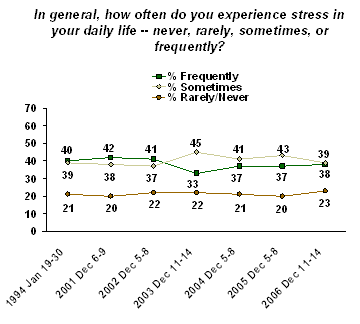
At least three out of four Americans have said they frequently or sometimes experience stress in their daily lives each time Gallup has asked the question since 1994. The percentage saying they frequently feel stress has fluctuated between 33% and 42%, and has not shown much significant change over the past three years.
Despite the prevalence of stress, 54% of Americans say they have enough time these days to do what they want to do, while 46% say they do not. Gallup has asked this question eight times since 1990, and Americans are typically evenly divided. About half say they have enough time and the other half say they do not have enough time, though in 2004 and 2006 the percentage saying they had enough time was slightly higher.
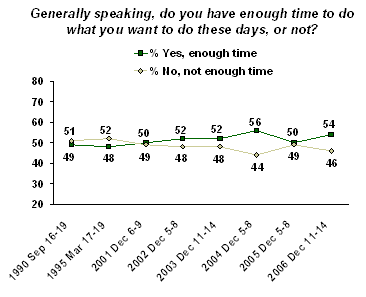
Americans who say they do not have enough time are much more likely than those who say they do have time to do things experience stress. Fifty-five percent of those who do not have enough time to do things they need say they frequently experience stress, compared with only 24% of those who say they have enough time.
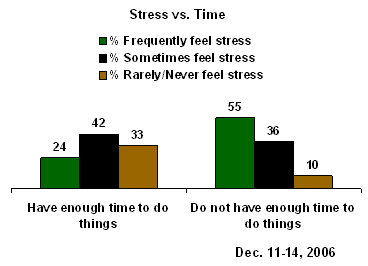
Who's Stressed?
Gallup combined the results of over 3,000 interviews in which these two questions have been included from 2004 through 2006 to allow for a more detailed view of who is affected by time and stress issues and who is not.
A statistical analysis of these data show that the following are significant and independent predictors of the frequency with which Americans experience both time and stress pressures: age, parental status, employment status, and gender.
Age
Older Americans, particularly those 65 and older, are much less likely to experience time and stress pressures than younger Americans.
More than 4 out of 10 adults aged 49 and under -- 44% of adults aged 18 to 29 and 46% of those aged 30 to 49 -- say they experience stress frequently. This compares with 37% of 50- to 64-year-olds and just 17% of those aged 65 and older.
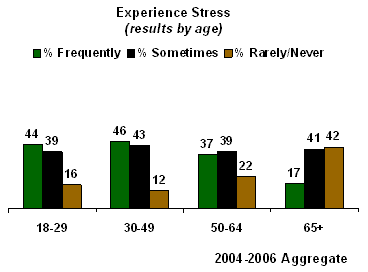
Forty-eight percent of 18- to 29-year-olds and just 41% of 30- to 49-year-olds say they have enough time to do what they want these days. This contrasts with a much higher 57% for those between the ages of 50 and 64 and an even higher 80% for those aged 65 and older.
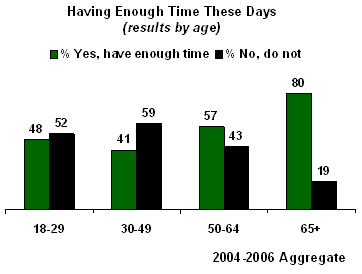
These age effects persist even when controlling for other known predictors of stress, such as employment and being a parent of young children.
Parental Status
Parents of children under age 18 are much more likely than those who are not parents of minor children to report stressful symptoms in their lives.
Nearly half of parents (47%) say they frequently experience stress in their daily lives, while only 32% of those who are not parents say they feel stress frequently.
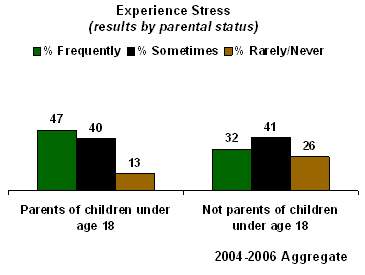
Only 40% of parents say they have enough time to do the things they want, while 59% say they do not have enough time. These results are essentially the opposite for those who are not parents of minor children -- 61% say they have enough time and 39% say they do not.
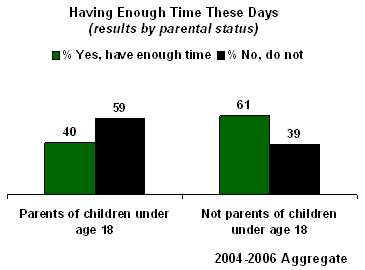
Employment Status
Americans in the workforce also feel greater time and stress pressures than those who are not in the workforce.
At least 4 out of 10 Americans who are employed full time (43%) or part time (46%) say they frequently experience stress. Only 29% of those who are not employed feel this way.
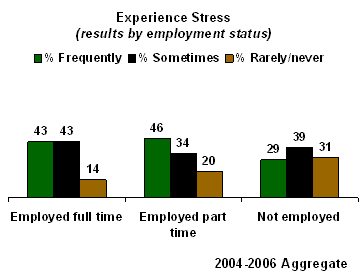
Nearly 4 out of 10 full-time workers (39%) tell Gallup they have enough time to do things, while 61% seem dissatisfied with their life in this regard. Lack of time seems to be much less of an issue for those employed part time (58%) and those who are not employed at all (72%).
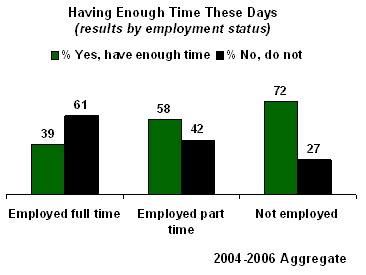
Employment and Parental Status
Parents who work full time are the most likely group of Americans to say they lack the time they need, but these workers do not differ that much from those without children in reports of stress frequency.
Forty-five percent of working parents say they frequently experience stress, only slightly higher than the 41% among those workers without children.
One in three full-time working parents (33%) say they have plenty of time, while a solid majority, 68%, says they lack the time they need. Among full-time workers who are not parents, 44% say they have enough time and 56% say they do not.
Gender
Women are slightly more likely than men (40% vs. 35%) to say they are frequently under stress, but roughly the same percentage of men and women complain that they do not have enough time to do things they want to do (45% vs. 47%, respectively).
Survey Methods
Results are based on telephone interviews with 1,010 national adults, aged 18 and older, conducted Dec. 11-14, 2006. For results based on the total sample of national adults, one can say with 95% confidence that the maximum margin of sampling error is ±3 percentage points. In addition to sampling error, question wording and practical difficulties in conducting surveys can introduce error or bias into the findings of public opinion polls.